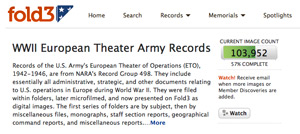The following news release was received from Fold3:

War is waged primarily in battle, yet made possible by operations beyond the battlefield as revealed in the WWII European Theater Army Records, a collection of administrative documents compiled by the U.S. Army’s Historical Division, 1941 through 1946. These records, originally marked secret and confidential, are now available on Fold3.
Created within the European Theater of Operations (ETO) during World War II, these documents are revealing, and often include personal accounts, as in this report of evacuating Allied prisoners of war. Names of soldiers and support personnel are on many of the records, but nowhere more prolific than in the phonebooks for U.S. Forces in Paris. A 1945 directory admonishes users to, “Never mention secret or confidential matters over the telephone,” then lists the names, ranks, addresses, and phone numbers of Paris-based personnel.
Troop provisions were recorded by the Army Exchange Service and include photos of the Coke Shack, beer bars and PX merchandise inside Nissen huts, which are the original British versions of what Americans know as the Quonset hut. To assure prosperity and health of personnel, savings plans were encouraged among the troops, and a quartermaster list index gives us an idea of what items were ordered for the men and women.
The minutes of a 1943 Conference Report account for the new “10 in 1” rations, cemetery beautification, and that General Littlejohn wears “red flannels” to keep warm and conserve heat. Chronologies, often in grid format, were important in keeping everyone informed of what was happening on all fronts, as in this brief account of the 1945 Allied bombing of Dresden.
Censorship files keep tabs on morale, including reports of physical ailments and combat fatigue. There are more pleasant excerpts from the mail of soldiers on R&R, explaining that “fat men are getting fat again and the thin men are doing the same,” as well as an account of how the French Riviera was reserved for enlisted men only.
Explore the ETO Records to discover more about U.S. operations in World War II and how the Army effectively maintained soldiers’ welfare and waged war behind the battle lines.